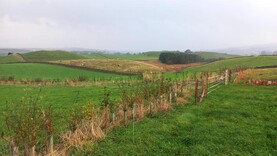Following on from two large rallies in both Welshpool and Carmarthern earlier this month, tractors and pick-ups blocked roads around Wrexham on Monday as farmers descended on the constituency office of Welsh Rural Affairs Minister Lesley Griffiths.
The main issue for farmers in Wales relates to the roll-out of a new Sustainable Farming Scheme (SFS) to replace the current Basic Payment Scheme (BPS). The SFS is to be introduced in stages, starting in 2025 and to be fully in place by 2029. Over the same period, the BPS will be gradually phased out. Farmers can choose to either receive SFS or BPS payments during this transition phase, but not both.
The SFS will provide a new annual baseline payment to farmers who undertake a set of “universal actions”. Included within an extensive list is a requirement to have 10% of suitable land on the farm in trees by 2030, while also having a further 10% actively managed as a habitat for wildlife. There are also proposals around use of cover crops on arable land over the winter, management of hedgerows and peatland, soil health planning and farm benchmarking.
An economic assessment, commissioned by the Welsh government, has suggested that if there is 100% uptake of SFS by farmers, it could lead to 11% reduction in both livestock and labour on Welsh farms. That assessment has been described as “bleak” and “shocking” by farming leaders in Wales.
Cull of badgers
However, it is not just future funding that is an issue, with many farmers also unhappy that the ruling Labour government continues to be against a cull of badgers to help control bovine TB.
In addition, there are also concerns around the roll-out of new rules after the Welsh government declared all of Wales a Nitrate Vulnerable Zone in 2021. From 1 August 2024, all farmers will have to comply with closed periods for spreading fertiliser and manures and will need at least five months of slurry storage capacity. Similar rules have been in place in NI since 2007.
Scotland
Meanwhile, the National Farmers’ Union of Scotland (NFUS) has welcomed confirmation from Scottish First Minister Humza Yousaf that there will be “no cliff edges” in farm payments. He told the NFUS AGM last Friday that when BPS ends in 2027, there will still be 70% of funding going towards similar direct support, known as Tier 1 and 2 payments.
However, farmers “will be expected to deliver far more for nature and climate in return for this funding,” said Yousaf.
Read more
Minimal change to area payments before 2026
Better to cut carbon than cull livestock, says Brown
Following on from two large rallies in both Welshpool and Carmarthern earlier this month, tractors and pick-ups blocked roads around Wrexham on Monday as farmers descended on the constituency office of Welsh Rural Affairs Minister Lesley Griffiths.
The main issue for farmers in Wales relates to the roll-out of a new Sustainable Farming Scheme (SFS) to replace the current Basic Payment Scheme (BPS). The SFS is to be introduced in stages, starting in 2025 and to be fully in place by 2029. Over the same period, the BPS will be gradually phased out. Farmers can choose to either receive SFS or BPS payments during this transition phase, but not both.
The SFS will provide a new annual baseline payment to farmers who undertake a set of “universal actions”. Included within an extensive list is a requirement to have 10% of suitable land on the farm in trees by 2030, while also having a further 10% actively managed as a habitat for wildlife. There are also proposals around use of cover crops on arable land over the winter, management of hedgerows and peatland, soil health planning and farm benchmarking.
An economic assessment, commissioned by the Welsh government, has suggested that if there is 100% uptake of SFS by farmers, it could lead to 11% reduction in both livestock and labour on Welsh farms. That assessment has been described as “bleak” and “shocking” by farming leaders in Wales.
Cull of badgers
However, it is not just future funding that is an issue, with many farmers also unhappy that the ruling Labour government continues to be against a cull of badgers to help control bovine TB.
In addition, there are also concerns around the roll-out of new rules after the Welsh government declared all of Wales a Nitrate Vulnerable Zone in 2021. From 1 August 2024, all farmers will have to comply with closed periods for spreading fertiliser and manures and will need at least five months of slurry storage capacity. Similar rules have been in place in NI since 2007.
Scotland
Meanwhile, the National Farmers’ Union of Scotland (NFUS) has welcomed confirmation from Scottish First Minister Humza Yousaf that there will be “no cliff edges” in farm payments. He told the NFUS AGM last Friday that when BPS ends in 2027, there will still be 70% of funding going towards similar direct support, known as Tier 1 and 2 payments.
However, farmers “will be expected to deliver far more for nature and climate in return for this funding,” said Yousaf.
Read more
Minimal change to area payments before 2026
Better to cut carbon than cull livestock, says Brown






 This is a subscriber-only article
This is a subscriber-only article










SHARING OPTIONS: